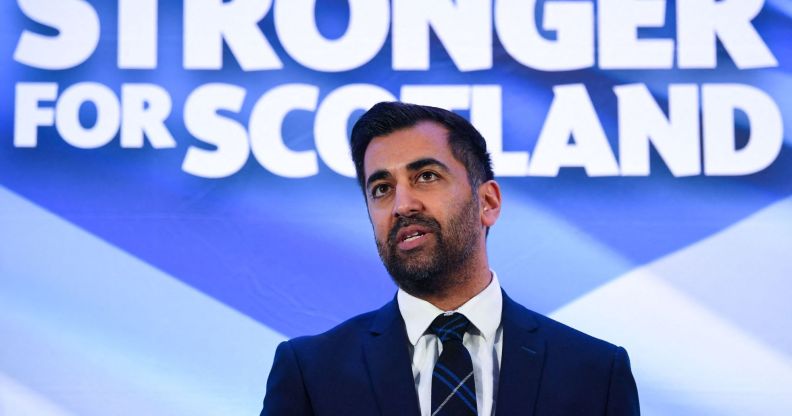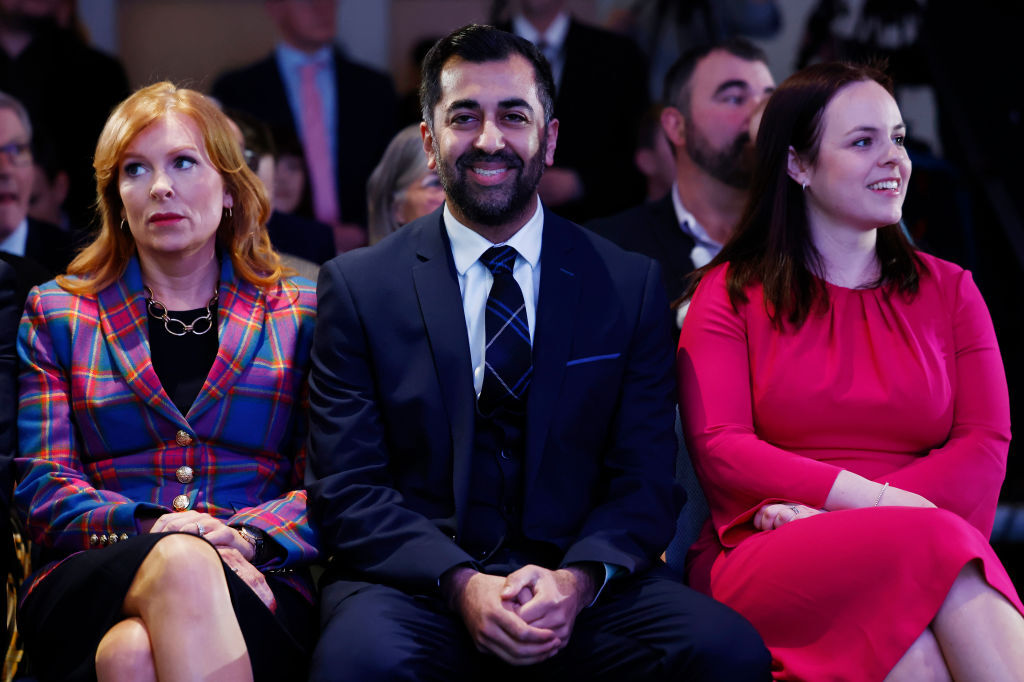Close SNP leadership result shows party has ‘work to do’ on LGBTQ+ and women’s rights

LGBTQ+ advocates, allies and politicians have welcomed Humza Yousaf’s victory as the new leader of the Scottish National Party (SNP). (Getty)
With 48 per cent of voting SNP members backing Kate Forbes for the leadership, the party has clear divisions to heal.
Humza Yousaf was elected SNP leader on Monday (27 March) with 26,032 votes (52.1 per cent) of votes once second preferences had been allocated. It was a close victory over Forbes, who received 23,890 votes (47.9 per cent).
Yousaf’s election is being celebrated by LGBTQ+ Scots and those who supported Nicola Sturgeon’s progressive agenda – Forbes was criticised throughout the race for her socially conservative views on same-sex marriage, abortion and sex before marriage.
Ellie Gomersall, NUS Scotland president, said on Twitter: “Let it always be remembered that 48 per cent of the SNP’s voting membership just voted for candidates who would’ve happily thrown the rights of queer people right under the bus.
“That tells you everything you need to know about the Scottish National Party.”
Erin Lux, co-convenor of the SNP’s LGBTQ+ group Out for Independence spoke in a personal capacity to PinkNews on the close election result.
Lux noted elections are “always difficult and a little bit bruising” but is confident the SNP is not as divided as it may seem.
She said: “Obviously we’ve got lots of work to do. Forty-eight per cent voted for candidates who were not going to be very good for LGBT rights or for women, so there’s work to do.
“But we’ve carried the day and we’re looking forward to working with Humza.”

SNP MP John Nicolson, who represents Ochil and South Perthshire, told PinkNews it is “simplistic” to look at the figures and think 48 per cent of people were “voting against trans rights”.
The veteran MP said people could have voted for Forbes for a variety of different reasons, many of which may not have been related to LGBTQ+ issues at all.
“Party members support progressive legislation, and the social conservatives departed and went off with Alex Salmond.
“The party itself is proud of its liberal, progressive identity. As I say, I think it would be a mistake to think that the 48 per cent who voted for Forbes were voting just simply on one issue.
“I really don’t think they were.”
Kate Forbes was criticised for saying she would have voted against same-sex marriage had she been an MSP in 2014.
She later apologised for any offence.
She also faced backlash for saying that having sex outside of marriage is “wrong” according to her faith, while many were nervous about her record on abortion.
In 2018, Forbes, an evangelical Christian, spoke at a religious event where she delivered a “prayer for the nation”.
“May our politicians recognise that the way we treat the most vulnerable – whether the unborn or the terminally ill – is a measure of true progress,” she said.
Forbes was among the SNP members to oppose reforms to the Gender Recognition Act.
While on the campaign trail, Yousaf told PinkNews he would “cement” LGBTQ+ rights as part of an independent Scotland’s constitution, saying he would not just “defend” such rights but “advance” them.
In the first round of voting, Yousaf received 24,336 votes (48.2 per cent) while Forbes had 20,559 (40.7 per cent) and Regan got 5,559 (11.1 per cent).
As the SNP election uses the Alternative Vote (AV) style of voting, the new SNP leader needed to achieve more than 50 per cent of the first preference votes to win outright. Where this does not happen in the first round, second preference votes are taken into account to determine the winner.

